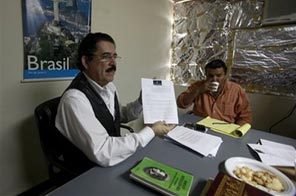Crisis talks resume in Honduras
TEGUCIGALPA: Honduras' de facto regime rejected a midnight deadline set by ousted President Manuel Zelaya to return him to power, as talks to end the four-month-long political crisis faltered.
Talks had resumed under growing international pressure, which prompted the de facto government of Roberto Micheletti to put a new proposal on the table.
The de facto government confirmed talks had restarted in a statement, but did not give details of the new plan.
After meeting behind closed doors with the Micheletti delegation, Zelaya's chief negotiator Victor Meza issued an ultimatum that Zelaya be returned to power by the end of the day or he would leave the negotiating table.
"If by 12 midnight (0600 GMT Friday) we haven't received an answer from Micheletti's delegation, we'll consider the dialogue terminated," he said.
Meza said he asked Micheletti to comply with the Organization of American States' (OAS) urging Wednesday that Zelaya be reinstated.
"We're not prepared to allow the putschist regime to use the talks as a tool to delay a solution, to postpone a way out of the crisis, to play for time. The dictatorship is stealing time from the Honduran democracy," he added.
Micheletti's response did not take long. He rejected Zelaya's ultimatum and reversed the blame for the on-again-off-again negotiations.
"This committee, having categorically rejected the 12 midnight ultimatum... states that our answer or counteroffer will be presented tomorrow at 10:00am (1600 GMT Friday," said Micheletti negotiator Vilma Morales.
She said that "both sides have started to deal with (Zelaya's) pretention to return" to office, and blamed his delegation for "delaying the end to this crisis," calling Zelaya's ultimatum "a step backwards."
The talks had stalled earlier this week on the issue of Zelaya's reinstatement.
Zelaya's team rejected as "insulting" a proposal from Micheletti's team that the Supreme Court -- which accused Zelaya of 18 crimes ahead of the coup -- should rule on the issue.
Zelaya's backers had said they would only return to talks if the ousted leader, who has been holed up in the Brazilian embassy for a month, first returned to office.
Meanwhile, Honduran election officials visiting Washington insisted that November 29 polls will go ahead despite growing skepticism from the international community.
Zelaya's term runs out in January.
International observers say the current mayhem would prevent a fair election campaign.
The European Commission Thursday joined the United Nations and OAS in saying they will not monitor the polls.
"Under no circumstances can we send an observation mission to Honduras," said Petros Mavromichalis, a EU regional official, speaking in Panama.
Amid growing criticism of the heavy-handed de facto regime, a report by a Honduran rights group, the Committee for Missing Prisoners in Honduras, said that 21 people had been "executed by violence or murder" since the coup, and that there had been more than 4,000 cases of human rights abuses.
The regime has said four people have been killed since June 28.
The pan-American OAS called Wednesday on the de facto leaders to protect Zelaya's safety, and condemned their "hostile actions" against the Brazilian embassy, after troops blasted loud music at the compound.
The United States, the country's main backer, has suspended millions of dollars in financial aid programs and canceled US visas for top regime officials and backers. Some Latin American leaders say they should go further.
Zelaya's ouster was backed by the country's courts, Congress and business leaders, and came after he swerved to the left and aligned himself with Venezuelan President Hugo Chavez.






